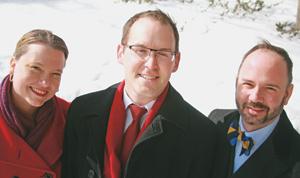Sharing common experiences and strengthening professional connections are a few of the reasons a growing number of federal government employees are joining Public Service Pride (PSP), a not-for-profit queer network based in Ottawa.
“Most people learn about PSP through word-of-mouth,” explains Jonathan Allen, PSP coordinator. The network began in 2004 with a few hundred email addresses but continues to grow, attracting more people to its distribution list and socials each month. “We have about 1,050 active contacts [across Canada],” Allen says, “most of whom either live or work in the Ottawa region.”
Combined with an official website, e-newsletters, a private Facebook page and a Twitter account, PSP also organizes monthly social events for public servants — as well as their colleagues and friends.
“We want our events to be inclusive,” Allen says, acknowledging that gay men typically dominate the PSP socials, held on the last Friday of each month. As he looks out to a crowded room at a recent event with a smile on his face, Allen estimates that about 150 people fill the space, including a few straight allies mixing in the crowd. “It can be intimidating to come out to a large venue with a bunch of new faces,” he admits.
PSP also has a women’s coordinator, Sarah Evans, who organizes separate socials on the third Thursday of each month. “I have about 500 women and groups on my contact list,” she says, noting that about 30 to 40 women actively participate in the socials. “The network helps to create real connections between people,” she says. “As the PSP women’s social has grown over the past five years, women from across the public service have become more and more aware of, and involved in, our network. Women tell me how much of a difference the network has made in their professional and personal lives, and that is very rewarding.”
Aside from bringing people together under one roof once or twice a month, Allen says PSP has a number of success stories, citing “phenomenal consultations” he and other coordinators have attended during the past few years. “We’ve been very successful with piggybacking on diversity or equity in the workplace, as well as education, connectivity and support.”
“But we’re not an official group,” Allen says. “We don’t ask for resources [from the government departments], and we’re not here to push an agenda for change,” he adds, referring to PSP as a social network — not an advocacy group.
“I also know people who have found job opportunities through peer networking and even a few romantic connections. Some are still together and some [relationships] didn’t last long,” he says.
Aiding the network, volunteer PSP coordinators operate within various government departments, referred to as “PSP chapters,” one of which includes the Department of National Defence (DND) and Canadian Forces (CF), co-chaired by Adam Crupi.
Crupi says membership in the DND/CF chapter of PSP has grown over the years to more than 60 individuals, including some retirees who regularly receive emails for upcoming events. His personal highlights working with PSP include assisting with Capital Pride since 2009 and helping members of the Canadian military to participate in the parade in uniform. The group marches together under a PSP flag, in part because PSP pays the parade entrance fee.
Noting his participation in diversity workshops with the federal government as another highlight, Crupi says he was also approached by a major US think-tank a few years ago when the Don’t Ask, Don’t Tell policy was being addressed. “I was asked to provide feedback, along with about a dozen other people, sharing our experiences on what it’s like to be gay or lesbian in the Canadian military,” he says. “We might have had a positive contribution, at least with helping to change policy within another military.”
According to these coordinators, part of what makes PSP a success is that the network doesn’t require much from participants. “It’s about valuing others, helping and supporting one another while promoting diversity,” Allen says. “People ultimately decide how much or how little they want to connect with PSP.”
“Essentially, we organize an event and hope people show up,” Crupi says. “What’s important is that we want people to know that we’re here — and we’re available.”
For more information on Public Service Pride, go to publicservicepride.ca.

 Why you can trust Xtra
Why you can trust Xtra


